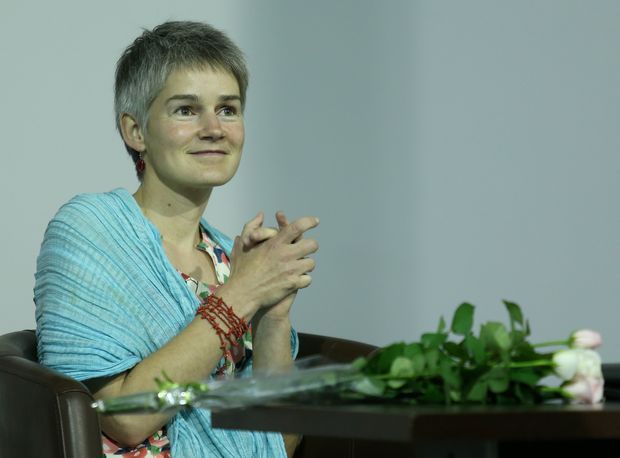Lily Hyde’s Dream Land
British writer and journalist presented in Kyiv a novel about the deportation of the Crimean Tatars
Lily Hyde lived and worked in Ukraine for 10 years. She published novel Dream Land in the UK in 2008. Using a Crimean Tatar girl called Safi as the narrator, it tells about her and her family’s return home from the forced exile. However, instead of the garden, which Safi always dreamed of, they face the harsh realities of the post-Soviet Crimea. In order to get on their own feet in that alien land that is their home, the Crimean Tatars have to overcome many difficulties and work hard. The author admitted that the genre of this work is closest to the family saga. While working on the book, Hyde held dozens of interviews and learned a lot about the history of the Crimean Tatars. Therefore, though the novel’s characters are fictional, all that happens to them is based on real events.
Dream Land was translated into French in 2011 and Crimean Tatar in 2013, while on May 14, the author presented at the Mystetsky Arsenal the Ukrainian translation, published by the Duliby publishing house. The presentation brought together politicians, artists, diplomats, members of the Crimean Tatar association in Kyiv and the Crimean Tatar Mejlis, as well as many interested Kyivites.
“When I was working on the book, my foremost objective was to tell the truth,” Hyde told us. “I hope I have succeeded in it. Of course, the work was not easy as I was hearing many tragic and terrible stories. On the other hand, though, the Crimean Tatars are very friendly people... I went to Crimea for the first time in 1995. I saw how people were living in tents and just starting to rebuild their lives in the new country. Despite this, the Crimean Tatars met me very warmly. They told me their incredible stories and treated me with wonderful sweets and coffee. Dream Land is a book about love. The Crimean Tatars are a very special people, they are so fond of their homeland that they fought for 50 years to get back to it. The love of freedom and the pursuit of peace are traits that shape their lives. The Crimean Tatar national movement has always been peaceful. This experience is important for the world. It is highly relevant for Ukraine, too, as it is now facing a threat of losing not only its territory, but also its language and culture. I really hope that the current situation will also be resolved peacefully. Exactly one year ago, I presented the Crimean Tatar translation of this novel in Simferopol. It seemed to me then that the situation in Crimea was in general not bad, and living conditions of this ethnic group were gradually improving. When the occupation began, I was in England. Everything I saw seemed to me a bad dream, as I could not believe that it was happening. In 2008, the British generally knew little about Crimea and its indigenous people, so my novel was a fascinating story for them. Now all the friends and acquaintances turn to me with their questions about these issues.”

HONORED ARTIST OF THE AUTONOMOUS REPUBLIC OF CRIMEA LENARA OSMANOVA PERFORMED A SONG ABOUT THE BEAUTY OF THE CRIMEAN MOUNTAINS AND SEA
The occupation of Crimea became one of the most discussed topics of the evening. “As much as 70 years have passed since the brutal deportation of the Crimean Tatars, but now they are again in danger in their own land,” said Anthony Fisher, director of the British Ukrainian Society which was a co-organizer of the event. “Ukraine is a country that respects diversity and protects different views, respects different identities and ethnicities. I want to appeal now to all Crimean Tatars and Ukrainians: you are not alone! You have millions of friends around the world. I, along with my colleagues, am willing to do everything I can to make the international community give its unqualified support to Ukraine.”
According to Ukrainian politician and diplomat Ihor Ostash, who became one of the sponsors of the book’s publication, part of the money earned from its sale will be given to charities. In particular, it will cover the costs of establishing a studio workshop of Crimean Tatar crafts in Kyiv, to be directed by ceramist Rustem Skibin.
Inspired by the book, many of the attendees recalled their family histories. “For every Crimean Tatar, Dream Land is a very closely-felt, living book,” head of the media and information committee at the Crimean Tatar Association in Kyiv NGO and co-coordinator of the Crimea SOS project Tamila Tasheva told us. “I lived in Samarkand, Uzbekistan until I was six. Our family moved to Simferopol then. As it usually happened, my father was the first to go. All Crimean Tatars were then living in similar circumstances in temporary windowless huts. My parents were building a house since that time and moved into it just this year. Fortunately, so far, no one is forcing them to abandon it, but I am not sure that the situation will stay this way tomorrow or the day after tomorrow... For the Crimean Tatars, a home of their own is an important symbol of homecoming. Despite it, many common people, not related to journalism or public work, are leaving their homes to move to the mainland Ukraine, as they do not want to live in Russia. It is remarkable that this book is published now as it will help Ukrainians understand that the Crimean Tatars are not strangers on Ukrainian soil. Fiction, unlike documentary, allows the author to familiarize a diverse readership with the topic. It is nice that in contrast to Western authors who until now were unaware of the Crimean Tatars, Ukrainian writers sometimes turn to the history of this nation. My favorite book on the subject is Volodymyr Danylenko’s novel Ghazals of Remzi the Pauper.”
Famous Ukrainian writer Liubko Deresh attended the presentation as well. “We invited Hyde to Donetsk in April and she took part in the Ukrainian Literary Festival Isolation,” Deresh told us. “There I had the good fortune to talk to her. Hyde seemed a very interesting person to me. During discussions and roundtables, she hit the target with every phrase. She is a perfect thinker, able to understand every situation and describe it accurately and simply. I know that she stayed in Donetsk after the end of the festival till a few days ago, and then went to Odesa. As a writer, a journalist and simply a human being, she tries to understand what is happening today in Ukraine and she empathizes with our country. I have a lot of respect for such a stance.”






